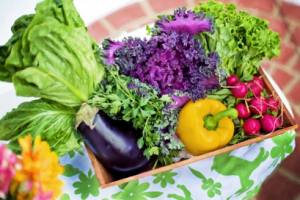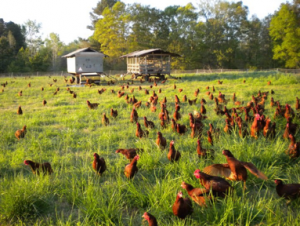Health Q & A is a LKN Connect Health & Wellness column published every two weeks. The readership is invited to submit questions falling within the fields of health promotion, wellness, and disease prevention. Content areas can include nutrition, diet, weight loss, supplementation, fitness, exercise, stress and anxiety, ancestral health, and epigenetics among others. Please direct questions for Health Q & A directly to Wayne Coolidge wayne@healthydynamic living.com
Q: Anne W. Asks: What does it mean to “eat clean?”
“Eating clean” can produce exceptional health benefits. Unfortunately, it’s a vague and confusing concept and means many different things to different people. There are no hard and fast rules as to what constitutes eating clean. I’ll try to identify a working definition that’s “about right” for most people.
Some food experts believe that adding anything to food, for example, calcium fortification in orange juice, would render the food unclean. I don’t believe that nutrient fortification backed by sound public health policy makes food unclean. Adding the preservative sodium benzoate, a carcinogen, to hot sauce — VERY unclean. Preventing goiters and enhancing bone mineralization by iodizing salt and adding vitamin D to milk — clean.
Is Your Food Presented Exactly as Nature Intended?
 There is a strong consensus of thought that believes foods that are minimally processed and devoid of chemicals and health-compromising anti-nutrients best define “clean eating”. My definition is a little stricter, but I basically fall into this category. I ask a simple question to help me determine if a food is “clean” or not. I ask whether the food is presented exactly as nature intended. It may seem over-simplistic, but it works well for me. The lone exception being nutrient fortifications like those mentioned above.
There is a strong consensus of thought that believes foods that are minimally processed and devoid of chemicals and health-compromising anti-nutrients best define “clean eating”. My definition is a little stricter, but I basically fall into this category. I ask a simple question to help me determine if a food is “clean” or not. I ask whether the food is presented exactly as nature intended. It may seem over-simplistic, but it works well for me. The lone exception being nutrient fortifications like those mentioned above.
Food is the biggest contributor to unhealthy chemicals, contaminants and genetically modified substances entering our bodies. In my opinion, just because a food meets “all-natural” criteria, doesn’t necessarily mean it meets my definition of clean. In today’s competitive and often deceptive food industry all-natural has become a term that has many different meanings.
All-natural beef is generally defined as “nothing added,” organic, antibiotic, and hormone-free, etc. If these all-natural cows are corn-fed their beef will be extremely high in inflammatory omega-6 fatty acids and very low in health-enhancing omega-3 fatty acids. That’s because the corn is high in omega-6’s and is stored in the meat and consumed. Even if the corn is organic it makes no difference. Grass-fed cows eat omega-3 rich chlorophyll-containing grasses. Grass-fed beef is produced as nature intended and much healthier.
I would obviously require vegetables to be organic and free of chemicals to be considered clean. An example of unclean plant matter, even if they are organic, is soy and corn. Soybeans and corn may be the two most genetically modified foods on the planet. We don’t yet know the full extent of the harm that genetically modified foods may be causing our bodies. Fermented soy products are much less modified and meet most expert’s definition of clean food.
You Can’t Improve Upon Mother Nature
 Prioritize the consumption of whole, unprocessed, organic, and non-genetically modified foods. The organic label must be validly attached to both vegetables and meats. Avoid herbicides, pesticides, preservatives, antibiotics, hormones, dyes and all other unnatural substances that contaminate our foods. The only way to do that is purchasing from trusted sources that are 100% verifiable organic. In terms of meat and fish the animals must be grass-fed, free-range, pasture-raised, and wild-caught. Animals raised eating a biologically familiar (historically correct) diet for that species is optimal. Remember, chickens aren’t vegetarians.
Prioritize the consumption of whole, unprocessed, organic, and non-genetically modified foods. The organic label must be validly attached to both vegetables and meats. Avoid herbicides, pesticides, preservatives, antibiotics, hormones, dyes and all other unnatural substances that contaminate our foods. The only way to do that is purchasing from trusted sources that are 100% verifiable organic. In terms of meat and fish the animals must be grass-fed, free-range, pasture-raised, and wild-caught. Animals raised eating a biologically familiar (historically correct) diet for that species is optimal. Remember, chickens aren’t vegetarians.
Eating clean may require a little research and adaptation to meet your individual needs. For the most part, eating clean is common sense. If you keep in mind that the food industry can’t improve upon Mother Nature when choosing your food sources you should be all right.
Photo courtesy: Open Pasture Meats
 Wayne Coolidge, Jr., M.Ed., CHES is an author, speaker, and innovative Health Promotion Scholar-Practitioner. He owns Wayne Coolidge Health Promotion, a consulting firm specializing in healthy aging, nutrition, nutritional supplementation, fat loss, fitness, and disease prevention. His expertise is designing lifestyle-optimization strategies leading to positive genetic expression, controlled cellular aging, health, and wellness. He has accumulated more than 31,000 hours of one-on-one training and personal consultation experience over a 36-year career. You can email him at wayne@healthydynamicliving.com.
Wayne Coolidge, Jr., M.Ed., CHES is an author, speaker, and innovative Health Promotion Scholar-Practitioner. He owns Wayne Coolidge Health Promotion, a consulting firm specializing in healthy aging, nutrition, nutritional supplementation, fat loss, fitness, and disease prevention. His expertise is designing lifestyle-optimization strategies leading to positive genetic expression, controlled cellular aging, health, and wellness. He has accumulated more than 31,000 hours of one-on-one training and personal consultation experience over a 36-year career. You can email him at wayne@healthydynamicliving.com.
The views, thoughts and opinions expressed by our writers
belong solely to them and do not represent
LKNConnect.com, its publisher or its staff.



